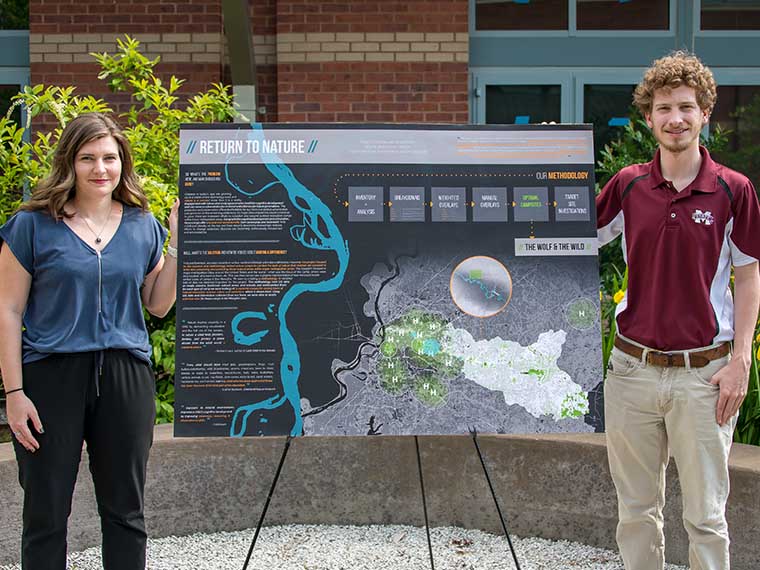The information presented on this page may be dated. It may refer to situations which have changed or people who are no longer affiliated with the university. It is archived as part of Mississippi State University's history.
According to the National Recreation and Park Association, "children today spend less time outdoors than any other generation, devoting only four to seven minutes to unstructured outdoor play per day while spending an average of seven and a half hours in front of electronic media."
This disconnect to nature is concerning for the future of conservation, and the health and wellness of people and communities.
That is why landscape architecture majors, Sara Peppers and Zack McWilliams, worked with the Wolf River Conservancy in Memphis, Tennessee, to encourage children to reconnect to nature.
Using geographic information system (GIS) technology and mapping, Peppers and McWilliams were able to pinpoint ideal spots along the Wolf River for potential nature camps to be located.
"We were trying to figure out how to get children to return to nature," Peppers said.
The team researched popular attributes of existing nature camps, which typically target middle-school and high-school aged children who have the ability to perform higher-skilled activities such as kayaking, ropes courses, and horseback riding.
"We spent a lot of time researching what a nature camp was, what it consists of, and how you make it. These camps are closer to what a Boy Scout or Girl Scout camp would be like. From there, we focused on locating potential sites for those types of camps," Peppers explained.
The team used GIS technology to layer elements of the natural environment, including land cover, roads, streams, and schools. They also layered modern infrastructure such as health facilities, existing buildings, and existing outdoor infrastructure such as botanical gardens.
"The GIS technology let us exclude or include certain elements for our sites, depending on what criteria we set," McWilliams said. "With our desired elements set, we were able to determine the most ideal campsite locations."
The team said the methodology they developed can be taken anywhere and applied to any natural area to locate a potential site for a nature camp.
"We found potential sites for the city of Memphis to use for nature camps, but to us that was not as important as creating a universal methodology to find them. It would be great to have this methodology spread out to different cities. This can be a base analysis for them to begin when planning a nature camp," McWilliams said.
Using this research framework, the team won the community engagement track in the Arts and Humanities category at the Mississippi State University Spring 2019 Undergraduate Research Symposium.
Peppers and McWilliams completed the project as part of an advanced design studio, which focused on regional planning and design, taught by Peter Summerlin, an assistant professor in the department.
"The studio was based in Memphis and we were all doing projects in that same watershed," Peppers said. "While most of our classmates focused on storm water management, we were assigned a different route."
With the help of Summerlin and Jason Walker, a landscape architecture associate professor, Peppers and McWilliams developed a universal method of locating nature camps that allows sponsoring organizations to select the best suited locations for potential camps depending on that organization's goals.
"With the development of this methodology, the Wolf River Conservancy and other natural resource education centers will be able to put nature camps in the most ideal location for the best camp possible, allowing them to better plan and implement their nature camps," Summerlin said.
Peppers, a native of West Memphis, Arkansas, earned a Bachelor of Landscape Architecture with minors in environment and sustainability, architecture, and sociology in May 2019. She is an intern with Denver, Colorado-based Design Workshop, an international landscape architecture firm. McWilliams, a Madison, Mississippi native, graduated with a Bachelor of Landscape Architecture, minoring in environment and sustainability in May 2019. He now works with Blair Parker Design, a Memphis, Tennessee-based landscape architecture design firm.

